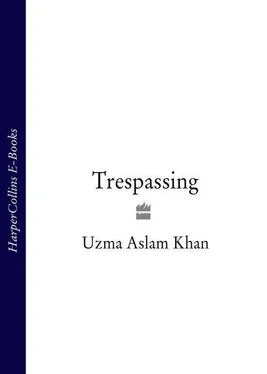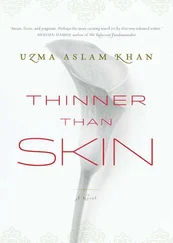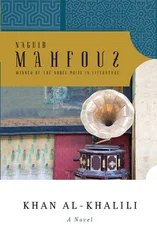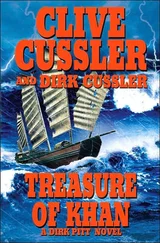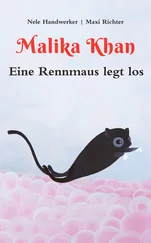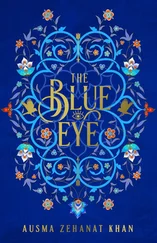Daanish continued reading without noticing her.
She’d kept her part of the agreement. Daanish had agreed to see Nissrine on the condition that Anu would not pressure him into a commitment. That was nearly two weeks ago. Though yearning for their engagement, she remained silent, with the occasional, ‘That Nissrine is so slim and educated. Just the type for young boys your age.’ Most of their conversations, whether about dinner or rain, began that way. It was just a suggestion. Not pressure.
She stood beside Daanish, the lawn outside conspicuously without birds and crumbs. The sky was overcast, soporific. The room, even with the fan above her head, a sauna. Perhaps July would bring rain. But then the roof would leak. More plaster would crumble onto the frayed carpets. It had been an ongoing fight between them: she wanting to spend on the house, the doctor on his travels. She save, he surprise. The worn carpets were visible again since the white sheets for the Quran readings were removed. She’d preferred the sheets.
Today was the fifty-first day after his death.
She was waiting for his presence to diminish. Waiting to stop counting the days. But she knew tomorrow, upon awakening, she’d think: fifty-two. Sitting up on her right side of the bed, she’d smooth the sheets carefully, afraid that her hand might stray over to his side, and touch, not emptiness, but him. And she’d rest her head on her knees and try not to hear his last words to her, spoken from the space her hand dared not venture. But she’d hear it, louder tomorrow than even today: There’s one gift you still haven’t found. But then, neither have I. She’d resolve not to let it haunt her. And all day, it would.
Anu sat down with a heavy sigh. ‘That Nissrine is so slim and educated …’
From behind the newspaper, Daanish cut in, ‘Just the type for young boys my age.’
She pursed her lips. ‘You’re enjoying keeping me in suspense.’
‘I admit I’m fascinated by your self-control. It would be interesting to see how long it lasts.’
She clicked her tongue. ‘You sound just like your father. He was always studying things. A man should not study his mother.’
‘Then what should he do with her?’
‘He should,’ she said emphatically, ‘listen to her every wish.’
‘When have I not listened to you?’ He smiled, putting the paper down.
‘I’m a very lucky mother,’ she said. ‘My son always listens to me.’ Then she added, ‘And always will.’
He laughed. ‘Unless his happiness is at stake.’
‘I think only of your happiness.’
‘But,’ he started to say, then hesitated. ‘I know you do, Anu.’
She was pleased. ‘Well, she is slim and educated.’
‘Do I detect you beginning to give in?’
‘You can at least tell me what you thought of her.’
‘I thought we’d already established that. She’s slim and educated.’
‘Did you like her?’
‘Her? Oh yes.’
Anu’s face lit up. ‘I knew you would. Well, I’m not going to, you know, put pressure.’ She stood up and walked over to his chair again. ‘You keep thinking that way,’ she patted him.
‘All right.’ He returned to the paper.
Protest March, it said. Anu peered closer, but the print began to swim. She was distracted. Snippets of the conversation she’d had with Nissrine’s mother the day after the tea returned to her.
‘Who was that horrible girl?’ she’d asked. ‘I’m so surprised someone as sensible as your daughter would be friends with, with that. And that’s twice now she’s spoiled it for her.’
‘You’re absolutely correct,’ Tasleem had answered. ‘She’s a terrible influence on my child and always has been. That’s what I’ve always said. And when Nissrine told me she’d actually invited her, I just couldn’t believe it. I mean, after that disgraceful episode in front of everyone. That be-shar’m has always made my daughter look bad. She has no sense of, of form. No social grooming What So Ever.’
‘What’s her family name?’
‘Dia Mansoor. Whoever heard such a silly name? What can you expect, given who the mother is …’
Her child.
She looked out again at the spot where the doctor would put the saucer. He was standing there, a touch blue in the arms and face, clad in the dirty white hospital gown he’d died in. When alive, he’d sat in the sofa and looked out. Now he looked in, as if she and Daanish were the sparrows his hand fed. After fifty-one days, he was still in charge. She panicked, growing increasingly desperate for Daanish to answer her.
She cleared her throat. ‘What are you reading? Anything interesting?’
‘Just sobering.’
‘Why don’t you read it to me?’
He looked up skeptically, then quickly summarized the article. ‘The office of an English-language daily has been raided. The five men in khaki claimed the paper had been making “anti-Pakistan” statements. So they confiscated its printing press. This was the two hundred and thirty-third attack on a newspaper office in the past six years. Journalists are protesting.’
Anu tried to read but the newsprint again flew in her face. Instead, she saw Daanish in Tasleem’s drawing room, twiddling his thumbs nonchalantly. He’d barely even looked at Nissrine.
She began combing his thick hair with her fingers. ‘This is,’ she said. ‘I mean this must be very interesting for you. Since you’re studying journalism.’
‘Yes,’ he pouted reflectively. ‘It is.’
In Nissrine’s drawing room, he’d turned to the girl with the bent nose. Riffat’s nose. Not much more resemblance. Her messy hair, for instance, was not like the mother’s. That woman had nothing better to do than trim and set hers daily.
Her son had smiled at her. She knew that smile.
Now Daanish was saying, ‘Aba never wanted me to be a journalist. He said I’d spend my life fighting, not just for the right to speak but to live. Poor Dada, who wallowed alone in jail all those years.’
His knees had been inches from the girl shamelessly pulling closer to him. Just like her mother. It was all in the blood, wasn’t it? And Nissrine’s blood was pure as the mountain air her ancestors had breathed centuries ago. Anu’s ancestors too. That’s why her flesh was so fair, her walk so measured, her eyes so lowered. But that one — shamelessly throwing her head back, cooing, ‘Really? What? Amazing!’
He did not even notice poor Nissrine offer the tea. Did not watch her pour the milk, mix the sugar. It sat on the table, cold, untouched. And all the while, the dark girl blinked flirtatiously, and he swiveled, and swiveled.
‘And yet,’ continued Daanish, ‘Dada was my hero. And so are these men and women,’ he pointed to the newspaper. ‘They live for a cause. What else is there to live for? They make me proud. There was no protest march by American journalists when a few came forward and confessed how they’d been silenced during the Gulf War. They admitted that if they’d spoken, they’d have lost their jobs. Speaking up at all was brave, but journalists here risk much more.’
What did he see in her?
‘But I wonder sometimes, Anu, am I as tough as them? It would have been easier if I were just like all the other Pakistani boys in the States, studying engineering or business. I’d come home fat and bouncy, like Khurram.’
Perhaps he liked them slightly boyish. Like that short, brown one in the photograph. She wore a cap that said Fully Food. An apron too. She didn’t appear to be wearing anything else. But there was hardly anything to see.
‘And then I read how the US insists we sign the non-proliferation treaty and I know I have to write. Never mind that not one member of the UN Security Council has signed. Never mind that all five permanent members began the arms race. Never mind that the weapons on our streets came from them, or that US arms exports continue to escalate. The Cold War has ended, and we’re no longer useful against the Soviets, so we’re the enemy.’
Читать дальше
Конец ознакомительного отрывка
Купить книгу
